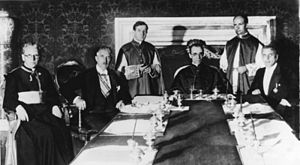 Global Information
Global InformationNazi views on Catholicism information

Nazi ideology could not accept an autonomous establishment whose legitimacy did not spring from the government. It desired the subordination of the church to the state.[1] To many Nazis, Catholics were suspected of insufficient patriotism, or even of disloyalty to the Fatherland, and of serving the interests of "sinister alien forces".[2] Nazi radicals also disdained the Semitic origins of Jesus and the Christian religion. Although the broader membership of the Nazi Party after 1933 came to include many Catholics, aggressive anti-church radicals like Alfred Rosenberg, Martin Bormann, and Heinrich Himmler saw the kirchenkampf campaign against the churches as a priority concern, and anti-church and anti-clerical sentiments were strong among grassroots party activists.[3]
The Hitler regime permitted various persecutions of the Church in the Greater Germanic Reich, though the political relationship between Church and state among Nazi allies was varied. While the Nazi Führer Adolf Hitler's public relationship to religion in Nazi Germany may be defined as one of opportunism, his personal position on Catholicism and Christianity was one of hostility. Hitler's chosen "deputy", Martin Bormann, an atheist, recorded in Hitler's Table Talk that Nazism was secular, scientific, and anti-religious in outlook.[4]
Biographer Alan Bullock wrote that, although Hitler was raised as a Catholic and retained some regard for the organisational power of Catholicism, he had utter contempt for its central teachings, which, if taken to their conclusion, he said, "would mean the systematic cultivation of the human failure".[5] Bullock wrote that Hitler frequently employed the language of "Providence" in defence of his own myth, but ultimately held a "materialist outlook, based on the nineteenth century rationalists' certainty that the progress of science would destroy all myths and had already proved Christian doctrine to be an absurdity".[6] Though he was willing at times to restrain his anticlericalism out of political considerations, and approved the Reich concordat signed between Germany and the Holy See, his long term hope was for a de-Christianised Germany.[7][8]
The 1920 Nazi Party Platform had promised to support freedom of religions with the caveat: "insofar as they do not jeopardize the state's existence or conflict with the moral sentiments of the Germanic race", and expressed support for so-called "Positive Christianity", a movement which sought to detach Christianity from its Jewish roots, and Apostle's Creed. William Shirer wrote that "under the leadership of Rosenberg, Bormann and Himmler—backed by Hitler—the Nazi regime intended to destroy Christianity in Germany, if it could, and substitute the old paganism of the early tribal Germanic gods and the new paganism of the Nazi extremists."[9]
- ^ Theodore S. Hamerow; On the Road to the Wolf's Lair - German Resistance to Hitler; Belknap Press of Harvard University Press; 1997; ISBN 0-674-63680-5; p. 196
- ^ Theodore S. Hamerow; On the Road to the Wolf's Lair - German Resistance to Hitler; Belknap Press of Harvard University Press; 1997; ISBN 0-674-63680-5; p. 74
- ^ Ian Kershaw; Hitler a Biography; 2008 Edn; W.W. Norton & Co; London; pp. 381–82
- ^ Evans, Richard J. (2008). The Third Reich at War: How the Nazis led Germany from conquest to disaster. London: Penguin. pp. 547–8. ISBN 978-0-14-101548-4.
- ^ Alan Bullock; Hitler: a Study in Tyranny; HarperPerennial Edition 1991; p218"
- ^ Alan Bullock; Hitler and Stalin: Parallel Lives; Fontana Press; 1993; pp.412
- ^
- Sharkey, Word for Word/The Case Against the Nazis; How Hitler's Forces Planned To Destroy German Christianity, New York Times, 13 January 2002
- The Nazi Master Plan: The Persecution of the Christian Churches Archived 2013-09-26 at the Wayback Machine, Rutgers Journal of Law and Religion, Winter 2001, publishing evidence compiled by the O.S.S. for the Nuremberg war-crimes trials of 1945 and 1946
- Griffin, Roger Fascism's relation to religion in Blamires, Cyprian, World fascism: a historical encyclopedia, Volume 1, p. 10, ABC-CLIO, 2006: "There is no doubt that in the long run Nazi leaders such as Hitler and Himmler intended to eradicate Christianity just as ruthlessly as any other rival ideology, even if in the short term they had to be content to make compromises with it."
- Mosse, George Lachmann, Nazi culture: intellectual, cultural and social life in the Third Reich, p. 240, Univ of Wisconsin Press, 2003: "Had the Nazis won the war their ecclesiastical policies would have gone beyond those of the German Christians, to the utter destruction of both the Protestant and the Catholic Church."
- Shirer, William L., Rise and Fall of the Third Reich: A History of Nazi Germany, p. 240, Simon and Schuster, 1990: "And even fewer paused to reflect that under the leadership of Rosenberg, Bormann and Himmler, who were backed by Hitler, the Nazi regime intended eventually to destroy Christianity in Germany, if it could, and substitute the old paganism of the early tribal Germanic gods and the new paganism of the Nazi extremists."
- Fischel, Jack R., Historical Dictionary of the Holocaust, p. 123, Scarecrow Press, 2010: "The objective was to either destroy Christianity and restore the German gods of antiquity or to turn Jesus into an Aryan."
- Dill, Marshall, Germany: a modern history, p. 365, University of Michigan Press, 1970: "It seems no exaggeration to insist that the greatest challenge the Nazis had to face was their effort to eradicate Christianity in Germany or at least to subjugate it to their general world outlook."
- Wheaton, Eliot Barculo The Nazi revolution, 1933–1935: prelude to calamity:with a background survey of the Weimar era, p. 290, 363, Doubleday 1968: The Nazis sought "to eradicate Christianity in Germany root and branch."
- ^ Bendersky, Joseph W., A concise history of Nazi Germany, p. 147, Rowman & Littlefield, 2007: "Consequently, it was Hitler's long range goal to eliminate the churches once he had consolidated control over his European empire."
- ^ William L. Shirer; The Rise and Fall of the Third Reich; Secker & Warburg; London; 1960; p. 240